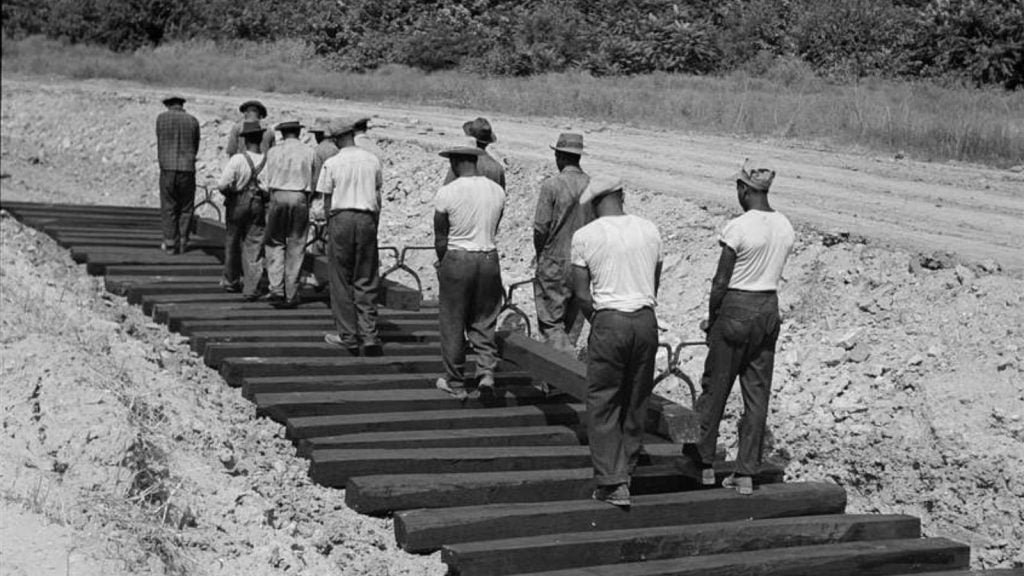For the Fall 2022 special issue of MQR, “Fractured Union: American Democracy on the Brink,” we reached out to a range of esteemed authors to write short essays that respond to Langston Hughes’s poem “Let America Be America Again
I believe it was in a high school English class that I first encountered Langston Hughes, reading the poem “Harlem” (1951), which famously conveys the pernicious effects of “a dream deferred,” in a series of four metaphorical questions likening the frustrated dream to increasingly disgusting physical processes—fruit, skin, flesh collapsing on itself—and a plainspoken fifth simile: “Maybe it just sags / like a heavy load” before the outward release of the final question, italicized and in its own stanza:
Or does it explode?
I remember one kid in the class gritting his teeth and nervously joking, “Don’t say that word deferred”—it was college application season in my striving suburban New York public high school—and I remember being struck by the poem: its energy, its compactness, the string of exciting figures of speech that made me feel the speaker’s subjectivity whether I wanted to or not. Now I know, too, that the hard rhyme of the final two lines must have caught my attention, along with the poem’s Elizabethan sonnet–like structure, interlocking rhyme followed by the knockout couplet, a music and form that I would embrace myself decades later.
Now in 2022, amid a new wave of depraved right-wing greed, openly anti-women and white supremacist, I’m reading another Hughes poem, from 1936, depicting the power and bitterness of the dream as promise of freedom and fair stakes for all. A poem in the mode of spell, an invocation to materialize the vision of a better place and time through speech acts, the anaphoras of “Let America” and “Let it be,” with their biblical associations, functioning as invitations to change rather than militant and idiotic orders. In the other anaphora, “I am,” the speaker talks himself, as a multitudinous “we,” into being, not only debunking the demoralizing destructions of “the same old stupid plan” but also claiming his/their stake by documenting the unacknowledged labor of millions that makes the concept/nation possible:
In every brick and stone, in every furrow turned
That’s made America the land that it has become.
These lines appear in a long, iambically grounded list in the middle of the poem that names those who have contributed not just to the vision of America but to its reality, through labor that encompasses both physical and emotional work over centuries:
Who made America,
Whose sweat and blood, whose faith and pain,
Whose hand at the foundry, whose plow in the rain,
Must bring back our mighty dream again.
Hughes acknowledges the tough grind of hope, placing faith and pain in the same category as sweat and blood, even as he builds to the last stanza’s call to action to keep reclaiming the right to a better, fairer land for all again and again, through devastating cycles of seemingly permanent setback:
Out of the rack and ruin of our gangster death,
The rape and rot of graft, and stealth, and lies,
We, the people, must redeem
The land, the mines, the plants, the rivers.
“Redeem” implies a former claim, earned through prior transactions, as well as a transformative process, rehabilitating what may be unsavory or even terrible, as a reputation or a nation’s blood-borne history. The dream of fairness isn’t for five men and one woman who schemed for the suffering of millions of women, ignoring precedent and our history, who placed automatic weapons in the hands of present-day lynchers and insurrectionists. In 1936 and now, we are the ones who must redeem, because we know what America isn’t, never was, was, and what it could be. We, the murdered, raped, and robbed, the would-be dupes, are the people, and it will take all of us to re-deem “these great green states.”
For more from the Fall 2022 special issue of MQR, “Fractured Union: American Democracy on the Brink,” you can purchase the issue here.





